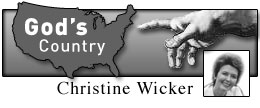
Don't believe everything you read in the papers. Didn't your mama tell you that?
I'm going to give you one more reason to listen to her.
One out of four Americans says he or she is an evangelical.
In the next four months, you're going to see that number cited in countless political stories. It will invariably be paired with the idea that evangelicals are a Republican bloc that John McCain must placate and Barack Obama has scant chance of winning.
Reader beware.
 Reporters glean from surveys what they think is important. A new national survey of the religious landscape from the Pew Forum on Religion and Public Life shows that those one in four Americans are not the sheep they've been made out to be. But don't look for that in most stories about the survey. It's not there.
Reporters glean from surveys what they think is important. A new national survey of the religious landscape from the Pew Forum on Religion and Public Life shows that those one in four Americans are not the sheep they've been made out to be. But don't look for that in most stories about the survey. It's not there.
There's no conspiracy to keep anything from anybody. The Pew study offers a mass of data, enough to keep scholars arguing for years.
What you already know does affect what you look for. And what you look for shapes what you see. I just wrote a book about evangelicals with findings that astonished even me. So let me tell you what I saw when I looked at what American evangelicals told the Pew researchers about their own beliefs. It was astonishing in light of what most people believe about evangelicals.
*Only 28 percent say that religion most influences their political thinking.
*Half are not Republicans or even leaning toward Republican candidates and policies.
*Half don't consider themselves conservatives.
*Fewer than half want to shrink big government.
*41 percent want government to be bigger and do more
*41 percent think government is too involved in issues of morality.
Are you getting a picture here that sounds a lot more like mainstream America than most of us thought it would?
Evangelicals also have some surprisingly untraditional Christian views.
* 53 percent think there is more than one way to interpret the teachings of Christianity.
* 57 percent think many religions can lead to eternal life. Many? That's what they said.
On the hot button issues of abortion and homosexuality, evangelicals surveyed by Pew in the summer of 2007 seem to be running true to stereotype. Sixty-one percent say abortion should be illegal in most or all cases and 64 percent say homosexuality should be discouraged.
But flip those statistics. They mean that more than one out of three evangelicals believes abortion should be legal in most cases. Most cases. Partial-birth? Late term? Sounds kinda pro-choice. Kinda like the mother ought to have rights. Who knew?
With regard to homosexuality, the Pew question is so tentatively put that it's hard to know exactly what the answers mean. The researchers asked whether homosexuality ought to be discouraged by society. Not whether it is an abomination or a sin or a sickness. Not even whether gays and lesbians should or shouldn't have equal rights. But whether it should be discouraged. Could they have come up with a more wimpy word?
It's no surprise that 64 percent of evangelicals said homosexuality ought to be discouraged. What's astonishing, considering evangelical stereotypes, is that one out of ten wasn't clear enough on the issue to even give an answer and one out of four said homosexuality ought to be accepted. Period. No quibbles at all.
One out of four of the most conservative group in America accepts homosexuality. Did we know this? I didn't.
Make no mistake, a high number of evangelicals are among the most conservative of Americans. Fifty-eight percent of evangelicals who say they go to church once a week are far more conservative than the ones who say they attend less frequently. That's true in almost all Christian categories.
But reader beware of church attendance statistics, too. The Pew survey and almost all other religious surveys tell us what people say, not what they do.
Researchers who count people actually in church find half the number who say they are there.
People aren't exactly lying. They're thinking that they should have gone to church last week, or they intended to go to church or they do go to church every week except during the summer or baseball season or the Christmas holidays. This tendency could be even more pronounced among evangelicals because of the type of faith they have.
A faith featuring a God who watches everyone closely and punishes people when they aren't doing right gives its adherents good reason to fool themselves -- and pollsters -- about what they're actually doing and maybe even what they actually are thinking.
Why does it matter that we be so skeptical?
Because evangelical pastors and leaders have been credited with being so effective at mobilizing their troops to vote in certain ways. They gained great power from that reputation. Some have gotten rich from it. Understandably. There's hardly any organization on earth as good at molding opinion as a church.
But if large numbers of evangelicals aren't in church, they aren't as likely to have their opinions molded. They aren't as likely to have their voting mobilized.
Participation in church matters because it means that if evangelical kingmakers were put to the test, they would not have as much power as they claim. Focus on the Family's James Dobson found his limits earlier this year when he vowed to sit out the election if John McCain became the front-running nominee.
Republicans will nominate McCain anyway. And Dobson did not take his toys and go home. He's stirring the pot just as vigorously as ever.
What all this means is that, contrary to expectations, McCain may have scored big points with many evangelicals when he spurned extremists John Hagee and Ron Parsley. Why?
Because many evangelicals are not like the ones you see on TV. Not just a few who've recently emerged. Many.
And Barack Obama may win the hearts of at least two out of four American evangelicals with a lot less effort than most of us ever imagined. For the same reason.
